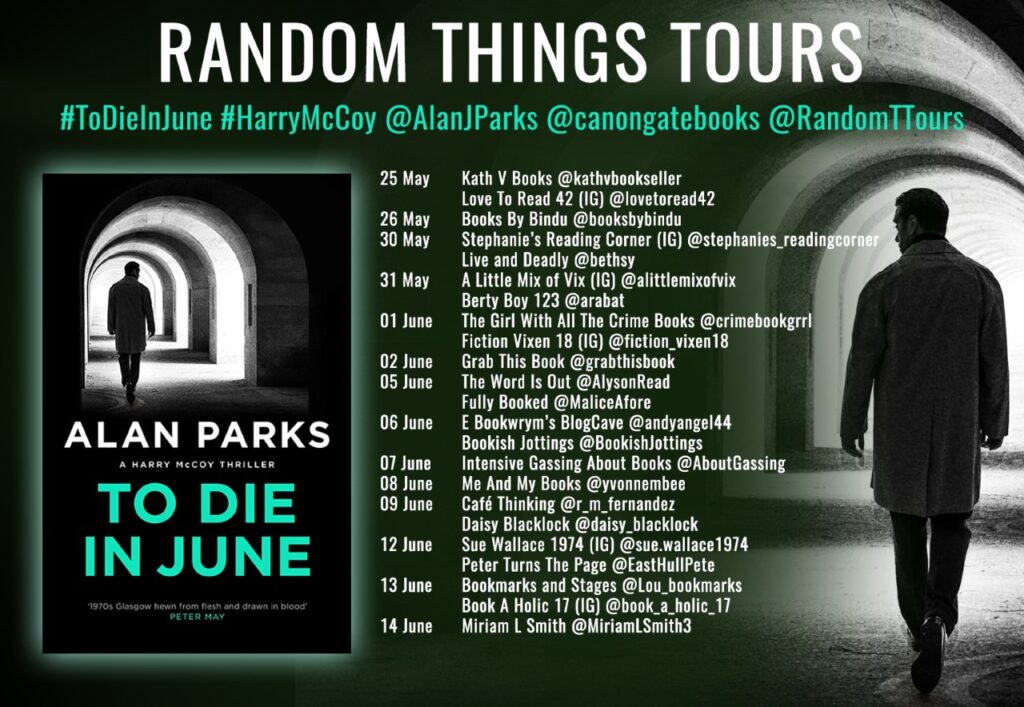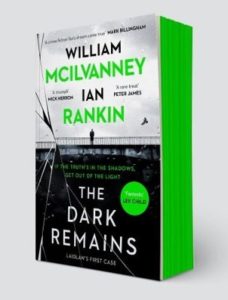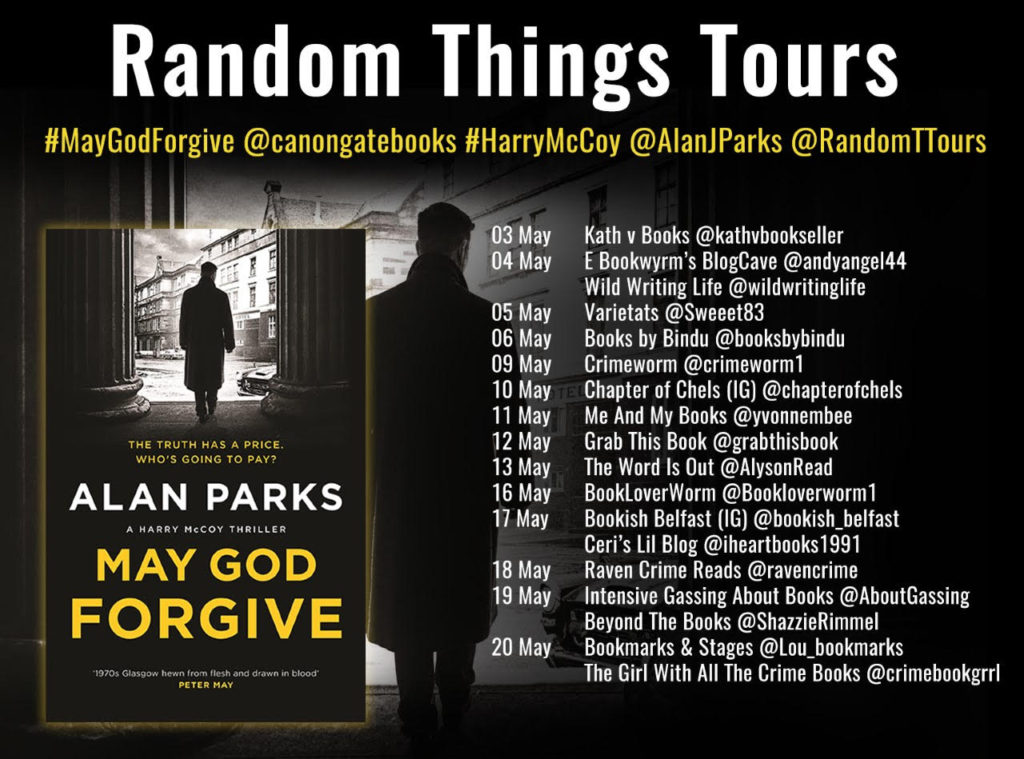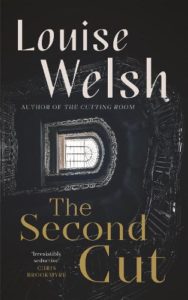To Die in June – Alan Parks
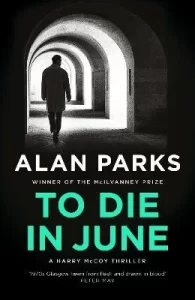 A woman enters a Glasgow police station to report her son missing, but no record can be found of the boy. When Detective Harry McCoy, seconded from the cop shop across town, discovers the family is part of the cultish Church of Christ’s Suffering, he suspects there is more to Michael’s disappearance than meets the eye.
A woman enters a Glasgow police station to report her son missing, but no record can be found of the boy. When Detective Harry McCoy, seconded from the cop shop across town, discovers the family is part of the cultish Church of Christ’s Suffering, he suspects there is more to Michael’s disappearance than meets the eye.
Meanwhile reports arrive of a string of poisonings of down-and-outs across the city. The dead are men who few barely notice, let alone care about – but, as McCoy is painfully aware, among this desperate community is his own father.
Even as McCoy searches for the missing boy, he must conceal from his colleagues the real reason for his presence – to investigate corruption in the station. Some folk pray for justice. Detective Harry McCoy hasn’t got time to wait
I received a review copy from the publishers and was invited to join the blog tour by Anne Cater of Random Things Blog Tours.
It is time for my annual trip back to 1970’s Glasgow to reunite with Harry McCoy, Wattie, Stevie Cooper (McCoy’s oldest friend and one of Glasgow’s biggest gangsters) and Jumbo – Cooper’s garden-loving dogsbody. There are other characters I can expect to pop up as I dip back into the world Alan Parks has created (albeit that world is Glasgow of yester-year) but I always know these familiar faces will command my full attention until I reach the last page of the book. I seldom know when a new book is due out but I am always looking out for the next book by Alan Parks and I’ve never been disappointed with the stories he spins.
To Die in June is the sixth McCoy thriller and events are set during the heat of the 1975 summer. It begins with a missing child. A young boy is not in the family home when his mother comes down the stairs in the morning. She rushes to the police station, hysterical and demanding help. McCoy initiates an immediate search of the area but when he visits the family home to speak with the woman’s husband he is told there is no missing child. The search is called off and McCoy’s standing with his new colleagues at Possil police station dips even further than he could have anticipated.
Possil is McCoy and Wattie’s new home. There are changes taking place – Glasgow Police is becoming Strathclyde Police and while the transitions for the force are phasing in McCoy and the increasingly capable Wattie have been relocated. Their relationship with their new colleauges is fractious but for McCoy there is an opportunity to align himself with the other officers stationed at Possil but to do so will mean turning a blind eye to some of their activities and even applying a strong arm, when necessary, to get the outcomes needed. There will be a share of any spoils if he does and with his chaotic personal life seeming to take a turn for the better – McCoy is now in an unexpected relationship with one of Scotland’s leading actors and even McCoy is realising he needs to smarten up a little to be seen with her. This burgeoning relationship leads to some wonderful cameos, particularly early in the story when McCoy finds himself at a swanky Scottish Awards dinner.
But To Die in June isn’t all about sipping wine at posh functions. Out on the streets of Glasgow it looks like someone is giving the rough sleepers a toxic concoction to drink. At least that’s what McCoy believes. His colleagues are quick to point out that it is not unusual for the less fortunate citizens to start drinking anything they can get their hands on and early deaths are not uncommon given the toxins they regularly pour down their throats. Regular readers will know McCoy’s own father is one of the homeless souls and McCoy’s sensitivity to the plight of the homeless is not somthing his colleagues are quite so quick to give time to. But McCoy is concerned when his father’s drinking friends are telling him some of their number are dying after drinking a particularly toxic mixture. Wattie trys to convince McCoy he is reading too much into a few random deaths but McCoy isn’t so quickly convinced and the time he spends looking for a link between these deaths is putting a strain on his relationship with Wattie who is trying to cover the official investigations which the pair should be concentrating on.
As we have come to expect from Alan Parks there are critical events bubbling away and their importance may not always be apparent to the reader. Until suddently that subtle bubbling explodes into a very big deal and McCoy has a huge problem on his hands. That’s when you realise how smoothly Parks has sneaked some really important clues into the story, the very best sleight of hand, and McCoy’s life is in turmoil again. Alan Parks just keeps getting better and better – every new book feels more assured and that’s from a point where he was already setting a very high bar.
Glasgow never felt more unpredictable and it’s the dirty, rough city of old. There’s rival gangs buslting for superiority, gangsters trying to establish “legitimate” business interests, a religious group to be investigated (forcing McCoy to quash his natural distrust of all things faith-related), unhelpful and unethical police officers working to their own agenda. McCoy walks a dangerous path between these factions and he remains one of the very best protagonists in crime fiction at this time.
To Die In June is a five star read. The Harry McCoy series should be required reading for anyone calling themself a fan of Crime Fiction.
To Die in June is available in hardback, digital and audiobook format. You can order a copy here: https://www.waterstones.com/book/to-die-in-june/alan-parks/9781805300786
